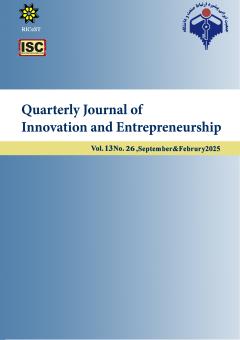Predicting Critical Thinking Based on Emotional Intelligence and Self-Efficacy Beliefs: A Case Study of Nursing Students at Lorestan University of Medical Sciences
Subject Areas : General
1 - Assistant Professor, Department of Business Managemnt, Islamic Azad University, Khorramabad Branch, Khorramabad, Iran
Keywords: Critical Thinking, Emotional Intelligence, Self-Efficacy Beliefs, Nursing, Multiple Regression.,
Abstract :
This research focuses on predicting critical thinking based on the emotional intelligence and self-efficacy beliefs of nursing students, with the aim of examining the impact relationship of emotional intelligence and self-efficacy beliefs on the critical thinking of nursing students. The main question addressed in this article is: What is the relationship between critical thinking, emotional intelligence, and self-efficacy beliefs? The research method used was correlational, and data was collected using a questionnaire with suitable validity and reliability (Cronbach's alpha for the critical thinking questionnaire was 0.76, the emotional intelligence questionnaire was 0.83, and the self-efficacy beliefs variable was 0.83). A sample of 148 students was selected randomly from the statistical population. The data was analyzed using SPSS software. The results showed that self-efficacy beliefs and emotional intelligence can predict the critical thinking of the students
Akbarzadeh, N. (2008). Emotional intelligence from the perspective of Salvi and others, Tehran, Farabi Publications, first edition.
Boyatzis, R. E., Goleman, D., and Rhee, K. (2000). Clustering competence in emotional intelligence: Insights from the Emotional Competence Inventory (ECI)s. In R. Bar-On and J.D.A. Parker (eds.), Handbook of emotional intelligence. San Francisco: Jossey-Bass, pp. 343-362.
Dastyari, A., Zarei matin, H., Danaeefard, H., Yazdani, H., & Babashahi, J. (2021). Exploring the Students’ Critical Thinking Disposition (Case study: Farabi Campus Students, University of Tehran). Public Management Researches, 14(51), 65-93. doi: 10.22111/jmr.2021.32722.4926
Goleman, Daniel. (2020). EQ. Translated by Nasreen Parsa 2019. 3rd edition, Tehran: Rushd Publications.
Khojasteh, S., Architect, S., Kianpour, M. (2014).The Situation of Tendency towards Critical Thinking in Students of the University of Isfahan and Some Factors Related to It, Journal of Applied Sociology, 2 (54), 117-138. (Persian)
Mayer,J.D.Salovey, p,.& Caruso, D.R. (2019). Emotional intelligence meets traditional standards for?an intelligence .Journal of Intelligence .27.pp:267-269.
Ricketts, J. C. (2003). The efficacy of leadership development, critical thinking dispositions, and student academic performance on the critical thinking skills of selected youth leaders. Unpublished doctoral dissertation, University of Florida, Gainesville. available at :http://etd.fcla.edu/UF/UFE0000777/ricketts_j.pdf.
Ranjdoost, Sh,. Eivazi, P,. (2013). The Relationship Between Emotional Intelligence of Teachers and High School Students Creative Thinking. Curriculum Planing Knowledge & Research in Educational Sciences, 10((36)), 113-125. SID. https://sid.ir/paper/127524/en
Sarvari M, Musavi Chilak A, Ziaee S. The Effect of Emotional Intelligence on the Critical Thinking of Librarians in the National Library of Iran. Human Information Interaction 2018; 4 (4)
URL: http://hii.khu.ac.ir/article-1-2707-fa.html
Orujlu S, Hemmati Maslakpak M. Assessing the Relationship between Critical Thinking and Self-Efficacy of Nursing Student. 3 JNE 2017; 5 (6) :11-17
URL: http://jne.ir/article-1-761-fa.html
Vahedi S, Marandi Heydarlou M, Imanzadeh A. The relationship between emotional intelligence and critical thinking in nursing students of Tabriz University of Medical Sciences. DSME 2015; 2 (1) :47-57
URL: http://dsme.hums.ac.ir/article-1-83-fa.html

